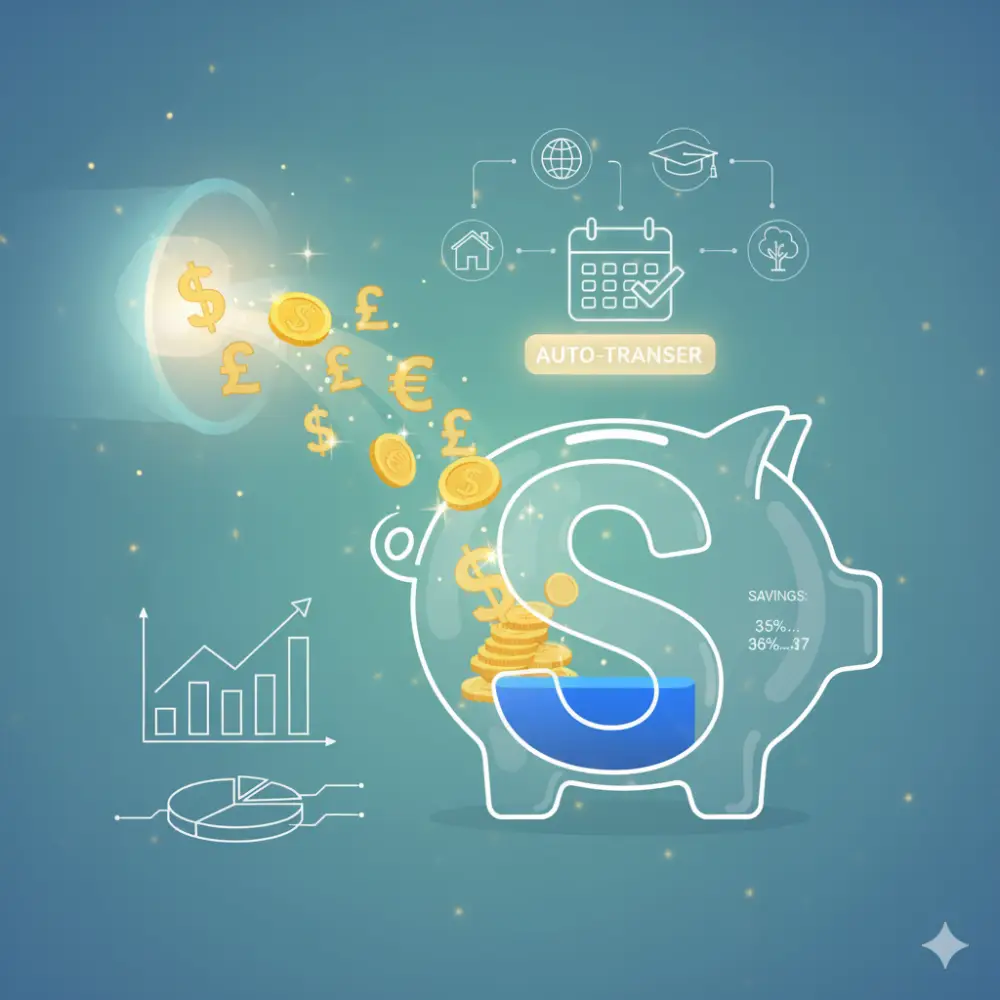Building strong financial habits starts with a simple but powerful principle — pay yourself first. Instead of saving whatever is left after spending, this approach encourages you to make saving your top priority. By automatically setting aside a portion of your income before covering other expenses, you ensure that your savings grow consistently over time. Whether your goal is to build an emergency fund, prepare for future investments, or simply gain financial peace of mind, paying yourself first creates a disciplined, sustainable path toward long-term security.
In this article, we’ll explore effective ways to make sure you pay yourself first regularly and develop a habit that strengthens your financial future.
Why Save First?
Paying yourself first means putting money in savings when you get paid. It builds financial discipline and makes you feel safe. Bankrate says this is key to having enough money to pay yourself first1. This guide helps new workers and students start saving money habits.Why It’s Good:
- Saves for emergencies like car fixes.
- Stops worry about bills.
- Makes saving a habit.
- Grows money over time. In 2025, 70% of savers feel calm.Check out what is the benefit of a savings account for more tips.
What Is Paying Yourself First?
What does paying yourself first mean? It’s saving some of your money before you pay bills or buy things. Think of savings as a bill you pay to yourself. Gauth says to make it automatic saving before spending2.How It Works:
- Save 10% of your paycheck.
- Pay bills after saving.
- Example: Ayesha saves $50 from her $500 paycheck.
How to Save Money Automatically

How could you make sure that you are paying yourself first regularly and building up your savings? Use automation. Setting up an automatic savings transfer moves money to savings without you thinking.Easy Steps:
- Get a savings account.
- Use your bank’s app.
- Set a transfer on payday.
- Start with $10 or $20.
- Add more when you can.Example: Ali sets $25 every two weeks. In a year, he saves $650. Bankrate says automation helps 40% more people save automated savings strategy.See best AI tools for small business productivity for helpful apps.
Best Ways to Save Money Automatically
Best ways to build up your savings automatically use direct deposit to savings and apps. In 2025, 55% of savers will use automation, says Wells Fargo.Auto-Save Ideas:
- Split paycheck: Send some to savings.
- Savings apps: Round up buys, save extra.
- Bank transfers: Move money every payday.
- Retirement plans: Save for later years.Example: Sara’s job sends $40 to savings monthly. She saves $480 a year.
How to Save from Every Paycheck
How to save money from every paycheck easily? Start small with personal budgeting methods.Paycheck Tips:
- Save 5% of your money.
- Use set-it-and-forget-it savings.
- Skip one small buy, like soda.
- Check your savings monthly.Example: John skips $3 snacks daily, saves $90 a month. Brainly says small cuts help budgeting for beginners3.Learn more at how to manage cash flow in a small business.
Easy Budget Tips to Save More
Simple budgeting tips to help save more money make paying yourself first regularly simple.Budget Ideas:
- 50/30/20 Plan: 50% for needs, 30% for fun, 20% for savings.
- Track money: Use a free app.
- Save first: Make it a must.
- Check spending: Fix overspending.Example: Emma uses 50/30/20, saves $100 from $1,000 monthly.
Saving with Low Income
How to start saving consistently even with a low income? Use saving goals and strategies for any budget.Low-Income Tips:
- Save $5 per paycheck.
- Use a monthly savings plan: $1 daily.
- Drop one app subscription.
- Try free smart money management apps.Example: Ali saves $10 monthly on $400 income, gets $120 yearly. In 2025, 60% of low earners save with automation.
Making Saving a Habit
How to make saving money a regular habit? Keep doing it for a consistent savings routine.Habit Steps:
- Set a goal: $500 in a year.
- Auto-save $10 weekly.
- Cheer small wins: $50 saved.
- Dream big: Save for a trip.Quote: “Little savings grow big.” – Bankrate saving money habits.See entrepreneurship skills every beginner should learn for habit tips.
Building an Emergency Fund
Effective ways to build an emergency savings fund keep you safe. Aim for 3 months’ bills, says 2025 Fidelity data.Fund Tips:
- Save $500 first.
- Use salary savings automation.
- Keep money in a savings account.
- Use only for emergencies.Example: Mia saves $25 biweekly, gets $650 in 6 months.
How Much to Save First?
How much should I save when paying myself first? Try 5–10% of your money.Savings Guide:
- Low pay ($500/month): $25–$50.
- Normal pay ($2,000/month): $100–$200.
- High pay ($4,000/month): $400+.
- Match your goals: Trip, house.Example: Tom saves 10% ($100) from $1,000 monthly, hits $1,200 yearly.Check your guide to human interest 401k boosting personal finance for goals.
Saving Without Missing Fun
How to grow your savings without feeling deprived? Mix saving and fun.Save and Enjoy:
- Save tiny: $5 weekly.
- Find free fun: Walks, not movies.
- Use effective money-saving strategies: Cook at home.
- Reward saves: $100 milestone treat.Example: Sara saves $15 weekly, still enjoys park picnics.
Best Apps for Auto-Saving
Best apps to automate savings make set-it-and-forget-it savings easy. In 2025, 50% of savers will use apps, says NerdWallet.Top Apps:
- Acorns: Saves spare change ($5/month).
- Digit: Saves extra cash ($6/month).
- Chime: Saves 10% of deposits (free).
- Qapital: Sets saving rules ($3/month).Example: John uses Chime, saves $300 in 6 months.
Online Banks for Auto-Saving
Online banks with automatic transfer options help automate your finances.Top Banks:
- Ally Bank: Free transfers, 2% interest (2025).
- Capital One: Easy app, no fees.
- Discover: Auto-transfers, 1.8% interest.
- Marcus: 2.1% interest, no fees.Example: Mia sets Ally transfers, saves $600 yearly. Gauth suggests online banks monthly savings plan.
How Saving First Cuts Stress
How saving first reduces financial stress? A 2025 Bankrate survey says 75% of savers feel relaxed.Stress Fixes:
- Emergency fund: Pays for repairs.
- Auto-saving: Feels easy.
- Confidence: You’re ready for surprises.Example: Ali’s $300 fund paid a vet bill, no stress.See what are three questions to ask yourself before you spend your emergency fund for more.
Steps to Financial Freedom
Small steps to achieve financial independence start with paying yourself first regularly.Freedom Steps:
- Save 5% first.
- Pay off credit cards.
- Try stocks later.
- Learn financial planning for beginners.Example: Emma saves $50 monthly, clears $600 debt yearly.Check how to build passive income through online entrepreneurship for freedom.
Real Saver Stories
Story 1: Ayesha’s Fund
- Saves $25 monthly by auto-transfer.
- Gets $300 in a year, fixes bikes.
- Lesson: Small saves work.
Story 2: John’s App Win
- Uses Acorns, saves $200 in 6 months.
- Keeps a fun lifestyle.
- Lesson: Apps make saving money effortlessly simple.
Story 3: Mia’s Low Pay
- Saves $5 weekly on $400 monthly.
- Reaches $260 in a year.
- Lesson: Consistent savings routine helps.
FAQs

How could you make sure that you are paying yourself first regularly and building up your savings?
Set up automatic savings transfer on payday.
What does paying yourself first mean?
Save before you spend, like a bill.
How to save money from every paycheck easily?
Use direct deposit to savings, try 5%.
How to start saving consistently even with a low income?
Save $5 monthly, use free apps.
How to grow your savings without feeling deprived?
Cut small buys, automate saving before spending.
Conclusion:
How could you make sure that you are paying yourself first regularly and building up your savings? Use auto-transfers, save small, and make it a habit. Paying yourself first regularly grows emergency fund savings and cuts worry. In 2025, 65% of young people will save more with automation, says Chase. Try saving goals and strategies to build money easily. Start now for a safe future.What’s your first saving step? Tell us below!
References
- Bankrate: Pay Yourself First – Explains saving first, automation perks. ↩︎
- Gauth: Automated Savings – Suggests recurring transfers. ↩︎
- Brainly: Budgeting Tips – Student Q&A on saving habits. ↩︎